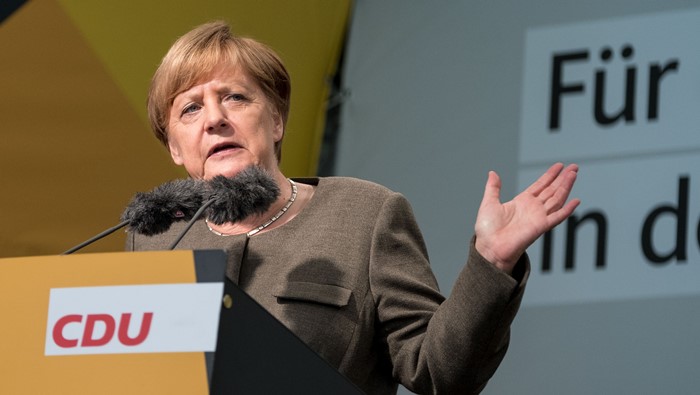German Chancellor Angela Merkel on Sunday criticized Turkey’s use of an Interpol arrest warrant to detain German writer Doğan Akhanlı in Spain, saying that this amounted to abuse of the international police agency, Reuters reported.
The 60-year-old writer was detained on Saturday at around 8:30 a.m. local time at his hotel in the southern Spanish city of Granada over an Interpol red notice earlier requested by Turkey.
Akhanlı was released on Sunday on condition that he remain in Madrid while Spain assesses Turkey’s extradition request, his lawyer Ilias Uyar said.
“It is not right and I’m very glad that Spain has now released him. (…) We must not misuse international organizations like Interpol for such purposes,” Merkel said during an election town hall event.
“(Akhanlı’s) is one of many cases, unfortunately,” Merkel said, in a sharpening of her tone toward Ankara.
“That’s why we have massively changed our Turkish policy recently … because it’s quite unacceptable that Erdogan does this.”
Having fled Turkey to Germany in 1991, Akhanlı was detained by Spanish police over an Interpol red notice earlier requested by Turkey.
Akhanlı is a member of International PEN and has written much on human rights issues as well as the Armenian “genocide.”
“His arrest was part of a targeted witch-hunt against critics of the Turkish government living abroad in Europe,” Akhanlı’s lawyer told German media.
Merkel’s statement came hours after Turkish President Recep Tayyip Erdoğan reiterated his call on Turks living in Germany not to vote for parties treating Turkey as an enemy.
“They closed the doors of Germany to the Turkish president. [Chancellor Angela] Merkel is also one of them. They are not connected to democracy. Now their foreign minister [German Foreign Minister Sigmar Gabriel] snipes at me. Who are you? I am not your interlocutor,” said Erdoğan during a ruling Justice and Development Party (AKP) meeting in İstanbul.
“They send messages to our country; why should I not send messages to theirs. Never vote for parties that are the enemy of Turkey. Go with Turkey-friendly parties. Don’t worry if the parties are small. Let’s make them bigger.”
Foreign Minister Gabriel on Friday reacted to Erdoğan’s calls on Turks living in Germany not to vote for parties of the ruling coalition and called it “an unprecedented attack on German sovereignty.”
Speaking during a party rally in Herford on Friday, Chancellor Merkel also said she would not tolerate any interference in the German elections.
“All German citizens, including those with a Turkish background, have the freedom to vote. We will not show any toleration for any interference,” she said.
SPD leader and a candidate for German chancellor, Martin Schulz, also responded to Erdoğan’s remarks on Twitter.
“Erdoğan has lost every measure. All the more, we are on the side of all those who are fighting for a free and democratic Turkey,” he tweeted on Friday.
Following a series of disputes between the two NATO allies due to Turkey’s crackdown in the wake of a botched coup attempt last summer, Merkel recently said a customs union agreement between Turkey and the European Union should not be expanded unless the tension eased with Turkey.
On Saturday Erdogan urged Turks in Germany to “teach a lesson” to Germany’s “anti-Turkish” mainstream parties in next month’s parliamentary election, despite German Foreign Minister Sigmar Gabriel’s warning that he should keep out of German politics.
“Who are you to talk to the president of Turkey? Talk to Turkey’s foreign minister. Know your place,” Erdogan said at a rally for his AKP in the southwestern province of Denizli.
European countries with large Turkish diasporas have grown increasingly uneasy at what they see as Ankara’s attempts to use ethnic Turkish populations to influence domestic politics.
“President Erdogan is trying to instrumentalize ethnic Turkish communities, especially in German and Austria,” Austrian Foreign Minister Sebastian Kurz told the Die Welt newspaper. “He polarizes and brings Turkish conflicts into the EU.”
The final days before elections in the Netherlands this year were overshadowed by violent protests by local affiliates of Erdogan’s party. German security officials have expressed concern about a possible repetition in Germany.

